Fashion Reimagined – Becky Hutner – Interview
By Claire Bueno 1 year ago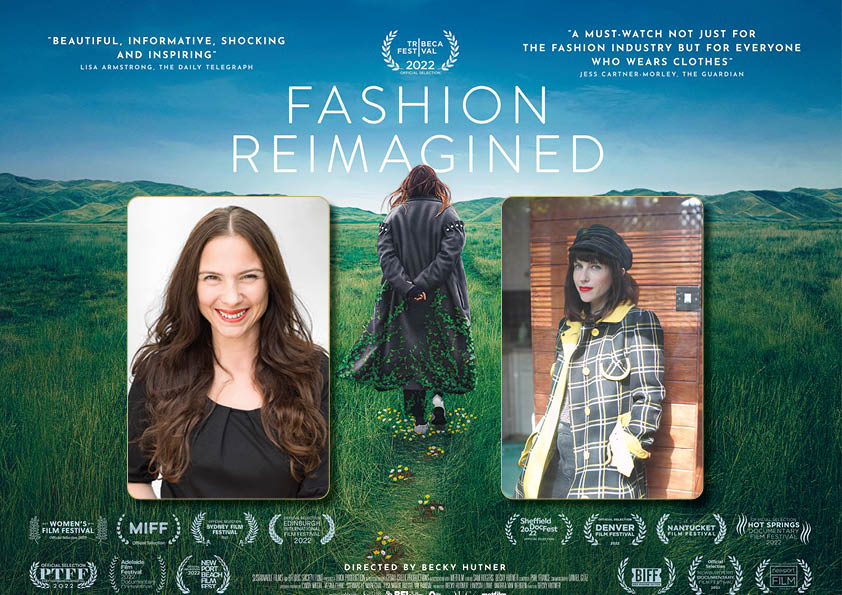
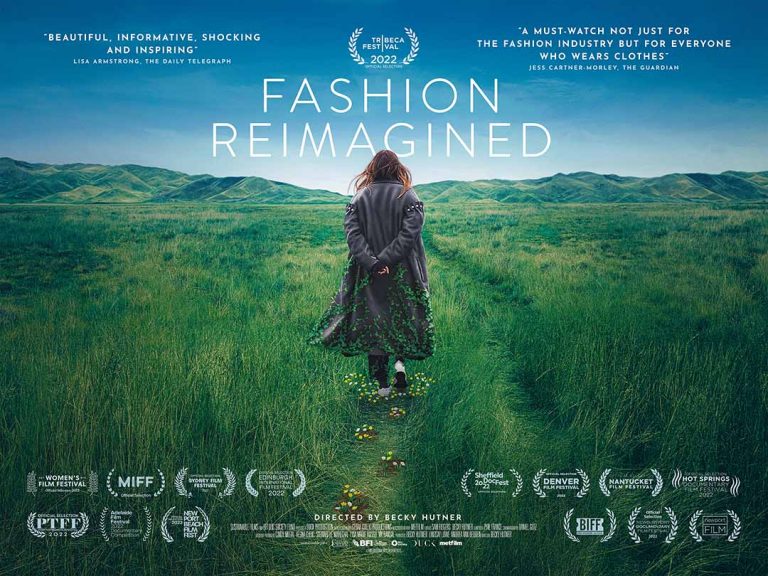
At A Glance
Follows Amy Powney, a daughter of environmental activists, during her trajectory from outsider to industry leader as she sets out to create a fashion collection that's ethical and sustainable at every level.

Film Details
Directed by Becky Hutner
Released by metfilm Distribution
2023, 100 minutes, Certificate 12A
In cinemas 3rd March.
Available Sky Documentaries & streaming service NOW from 9th April.
Social Media: @FashReimagined
Cast
Amy Powney as Self
Chloe Marks as Self
By Claire Bueno
What I really enjoyed about the documentary is that this really is a human-interest story about Amy Powney and her personal crusade to create ethically sourced sustainable clothing, which really does give the audience a rooting interest doesn’t it?
Thank you! Yes, I think Amy is such an engaging and accessible way into this very

difficult and complex issue. The climate impact of clothing production and the intricacies of global supply chains are not the sexiest topics for a film! And so I’m extremely grateful we were blessed with this determined, authentic, articulate character as our guide.
You know, I always knew I wanted to follow Amy’s mission with No Frills from the beginning of the project, but I did toy with including other sustainable designers and bringing in more voices in the space. However, it quickly became apparent that Amy was such a compelling person and her background and journey so unique that she alone could and should carry this film. She really is the woman for the job – both a fashion insider, dressing celebrities and hobnobbing with royals and an outsider, a young woman from a rural, working-class background who worked her way to the top through sheer tenacity and talent.
I also think by going in a character-driven direction, we avoid getting too sanctimonious and preachy. At least that’s the hope. The last thing I want is to overwhelm audiences and make them feel like we’re wagging the finger. I hope that in sharing this very inspiring person from humble beginnings who was able to make a difference in her sector, that others feel galvanized, not shamed.
What I found really inspiring was Amy’s courage, it takes somebody incredibly brave to walk the walk and not just talk the talk and put herself out there to potentially fail doesn’t it?
Yes, Amy does have a lot of courage. She worked extremely hard to get to the position of Creative Director at a highly respected fashion label, Mother of Pearl, starting as an intern there with no money or connections. In 2017, she gets recognized with the UK’s most prestigious award for emerging designers, the BFC/Vogue Designer Fashion Fund. And what does she do? Risks it all in order to live by her values. It was at this time that I first met her, and she was genuinely at the stage where she would either do her damndest to make Mother of Pearl sustainable or leave the fashion industry. How many of us are truly willing to sacrifice our dreams for the greater good? Sadly, I think the Amy’s of the world are quite rare.
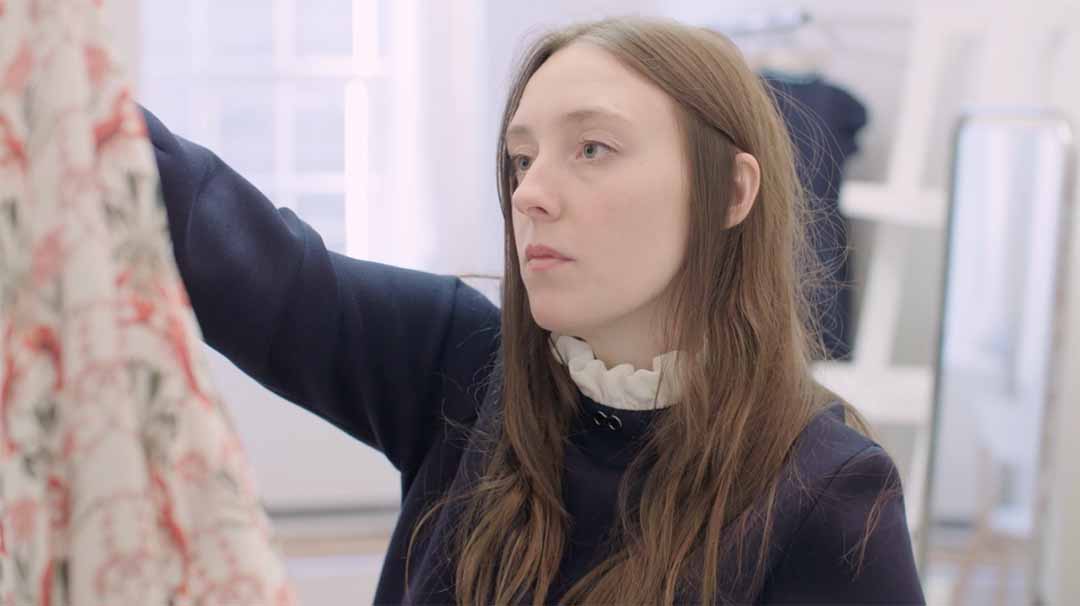
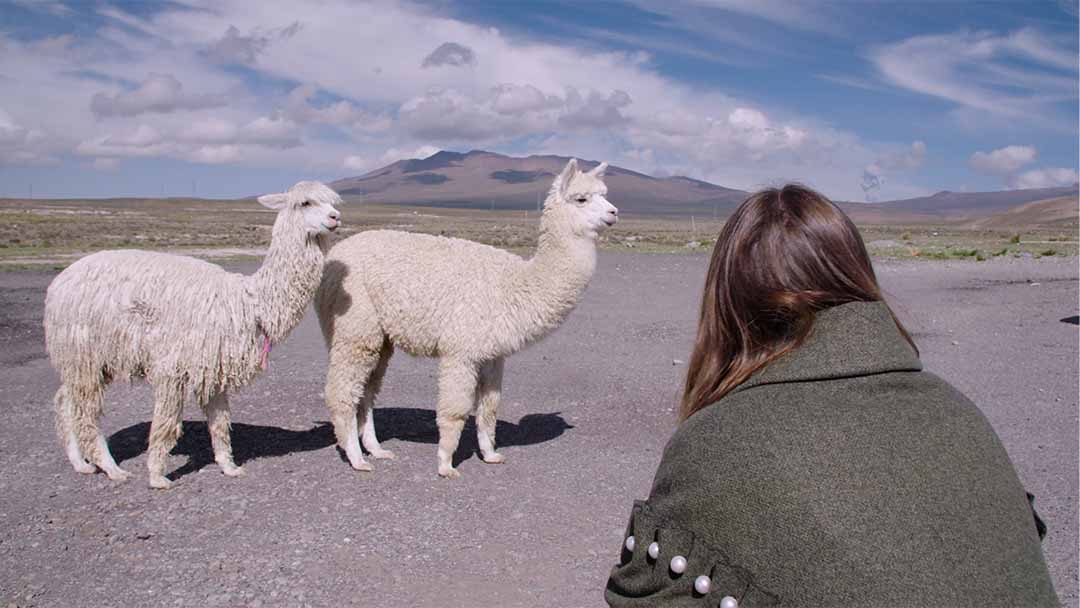
I found Fashion Reimagined to be very accessible, you don’t have to be a fashionista to appreciate the film. How conscious were you of this to give the film broader appeal?
That’s great to hear! I really want the film to have a broad appeal because we all wear clothes and so we are all connected to this problem. All clothes whether “fashionable” or not have the same devastating impact on the environment. We even toyed with keeping “fashion” out of the title so as not to alienate a wider audience.
Some of the best audience reactions so far have been from people who have nothing to do with the industry and no interest in fashion. Definitely some male partners of friends who dragged them along to screenings have come up to me after, completely surprised by how much they enjoyed the film. I think it’s the combination of the educational aspect and Amy’s David and Goliath narrative that are striking a chord with people. Everyone loves rooting for the underdog and I think people are really seeing themselves in Amy – and her onscreen partner-in-crime Chloe. They don’t fit the mould of the fashion diva at all. And the film is fun! It’s part detective story, part buddy movie. I hope there’s something in it for everyone.
The journey towards the launch of Mother of Pearl’s, sustainably sourced No Frills range forms the narrative of a triumph over adversity documentary. As a documentary filmmaker myself, I am conscious that any story needs a structure, but you must also be open to the organic nature of documentary filmmaking, is that what you found?
Yes. The hardest part of making this film was the edit. It took 18 months. Documentary editing is so painful because of course, real life does not fit neatly into a dramatic structure. Unless you’re following a race or some other very overt ticking clock, you have to create this structure but of course do it in a way that is true to the real-life events. Add to this the interweaving of an urgent environmental issue and oh my, it was a major puzzle! What ended up happening with us as is the case on many docs, is that we had to sacrifice a lot of incredible material in service of the core narrative. Baby killing left and right.
But yes, you do have to be open to the organic nature of it all. As Amy’s journey evolved, as the sustainable fashion movement evolved, as we entered a global pandemic, as Amy and I experienced motherhood for the first time – all of these things evolved the direction and ultimate message of the film. It’s a beautiful, bewildering, wondrous, maddening process!
“Sustainability will look different for everyone depending on circumstances and it’s time to shed the elitist image of sustainable living.”
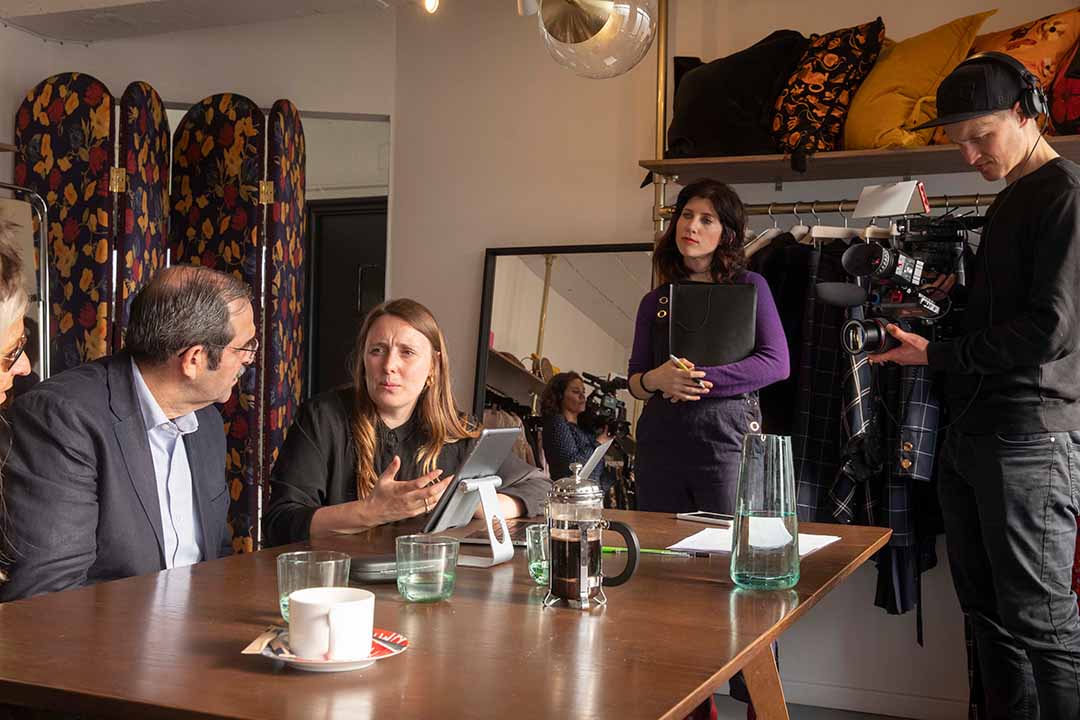
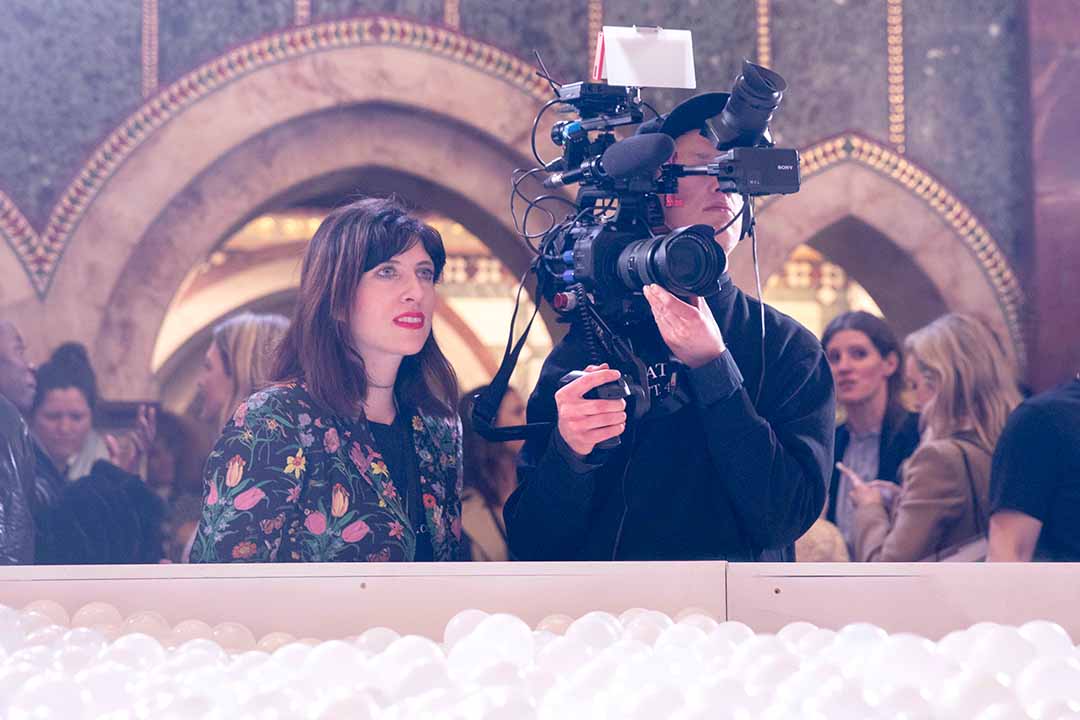
During the making of the film was there anything that surprised you and you didn’t expect?
Yes. One of the biggest surprises and it’s a happy one – spoiler alert – is that Amy, a relatively unknown independent designer in East London was, in the course of the film, catapulted to the forefront of the sustainable fashion movement! And we were there to capture that trajectory. She went from calling a man about a sheep to being a leading voice on this issue, making regular appearances on BBC News, getting her own column in Vogue, collaborating with cutting edge scientists and dressing eco-conscious celebrities like Gwyneth Paltrow and Emma Thompson. We get to see the evolution of a rather shy woman in her twenties who is self-conscious about her unorthodox background to a woman says fuck it, and decides to embrace who she is. She makes her difference her superpower. What an incredibly serendipitous, powerful thing to have captured on camera.
Becoming more economic, less wasteful is a powerful message within the film, how conscious were you of this when it came to your filmmaking and being conscious of your own carbon footprint?
Painfully conscious I would say! Like Amy, I have been on my own sustainability journey since 2011 when I worked as an editor on an environmental documentary called Revolution. The film was about the collapse of the oceans, climate change, the current mass extinction we’re going through – issues I had never thought about and it just knocked me sideways. Trying to live sustainably has been the focus of my life ever since. And so the way I approached production was a natural extension of how I try to live my life. Obviously, I am far from perfect, in my personal life and on this production but I don’t think we should get caught up in perfection because that is just impossible. I read a quote recently, “Perfect is good, better is best.” Far more impactful for a critical mass of people to do “better” than for a small group of sustainability purists to be “perfect.”
To give you some tangible examples of how we approached sustainability with this production, starting with our production office, our producer Lindsay Lowe from DUCK Productions was really inspired by the subject matter and immediately switched to green energy – I think it was Ecotricity. She also banned single use plastic from the office, buying everyone a Swell water bottle.
In the field, we did more international travel than I would normally be comfortable with from a climate perspective, but I felt that in this instance, where a pillar of Amy’s mission was transparency, seeing every step of her supply chain with her own eyes, the travel was warranted. And so we did our best to minimize our impact by carbon offsetting – in our case a donation to the wonderful reforestation charity Tree Sisters – bringing self-filtering water bottles from Camelbak that purify tap water with UV light (miraculous, have been using the same one for 10 years), bringing snacks like nuts & dried fruit in reusable containers to avoid unnecessary food packaging, working with local crew and guides, eating in local sit-down restaurants and staying in Airbnb’s and locally-owned accommodation.
Amy’s story may be the vehicle driving this initiative, but the film is much more inclusive. For me the power of your message is it’s about a collective, it’s about all of us uniting manufacturers and public alike, taking more responsibility to make a positive change. It feels by the end of the film you’re passing the baton over to the audience to help continue to make change, was this a conscious choice?
Yes, thank you for recognizing that. That was the intention – here is one woman’s story, now what are YOU going to do? I hope that by including Amy’s Fashion our Future campaign near the end, in which participants make a pledge around their relationship with fashion – to only buy second-hand for a year, to fix their clothes before buying something new – that this invites everyone in. I wanted to end on a very inclusive note with lots of actionable ideas for how audiences can engage with the issue as soon as they leave the cinema! Ideas that don’t necessarily involve buying expensive “sustainable” clothing. Sustainability will look different for everyone depending on circumstances and it’s time to shed the elitist image of sustainable living. I just want everyone to come away feeling like this issue is approachable and something they can talk about with their friends and embrace in their own way. As Amy likes to say, “if the girl from the caravan can do it, you can do it too.”
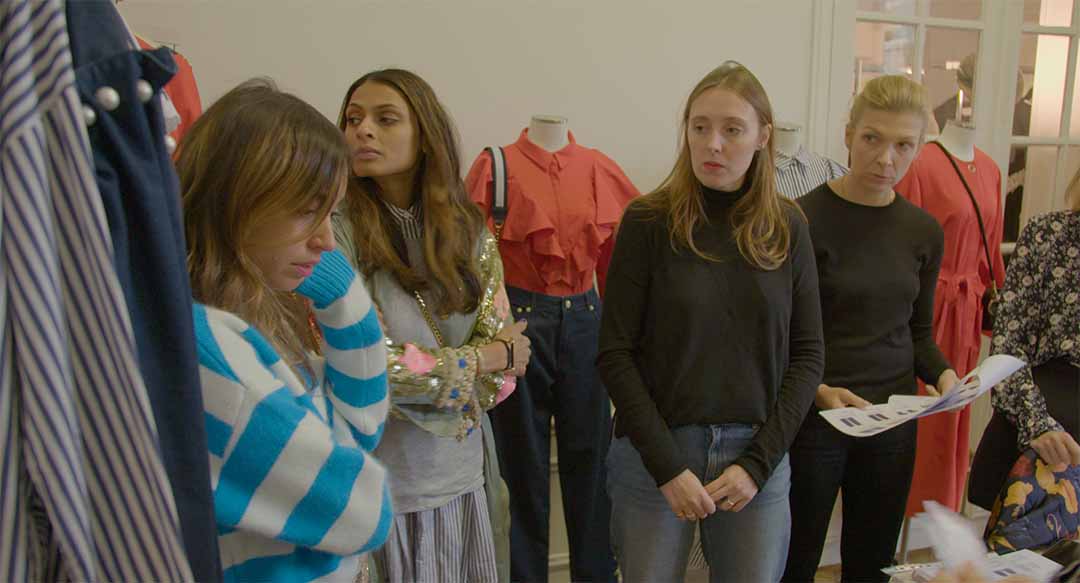
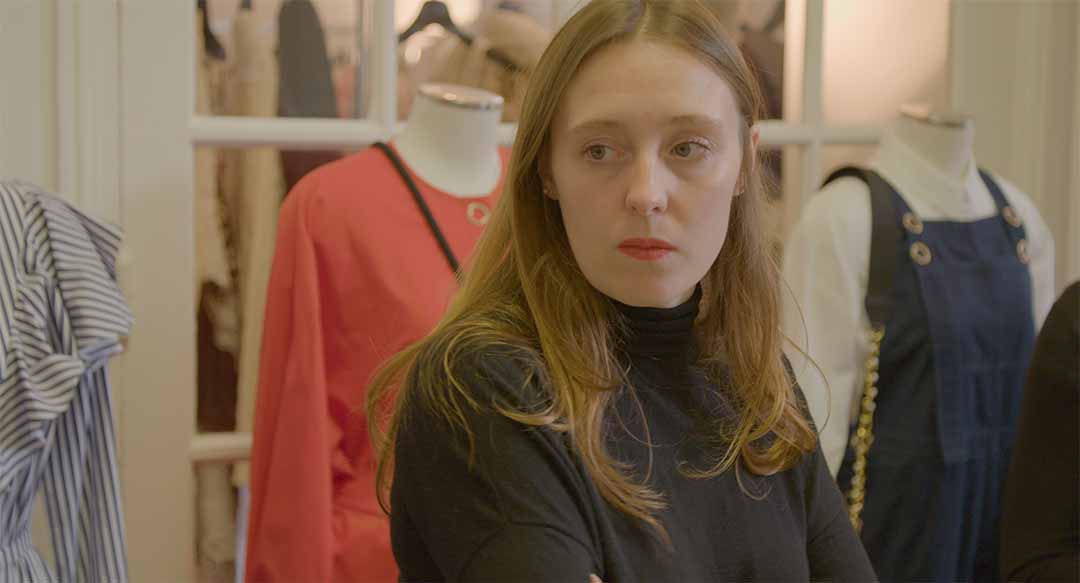
Statistics In The Film
We buy 3 times as many clothes as we did in 1980.
And wear them for half as long.
SOURCE: Dana Thomas
Fashion is the 4th largest contributor to climate change in Europe after food, housing and transportation and the 3rd largest consumer of water.
SOURCE: European Commission
It takes a major fashion CEO just 4 days to earn what a Bangladeshi garment worker will earn in their entire lifetime.
SOURCE: Oxfam
We produce over 100 billion garments a year.
SOURCE: McKinsey
3 out of 5 garments go to landfill within one year of purchase.
SOURCE: McKinsey
35% of ocean microplastic comes from synthetic clothes shedding in washing machines.
SOURCE: International Union for Conservation of Nature report
In 2020, China produced 48 billion meters of fabric. That's enough to wrap around the world over 1200 times.
SOURCE: The Life and Death of a Garment by Maxine Bedat
The secondhand clothing market is growing 11 times faster than traditional retail and will outpace the growth of fast fashion by 2030.
SOURCE: Thredup
Insecticides are the most dangerous category of pesticide and cotton uses more insecticides than any other crop. Many insecticides are driving the extinction of bees. 3 are fatal to people, if inhaled.
SOURCE: Cotton: A Case in Misinformation
ADDITIONAL STATS
Traditional denim washing uses 1500 litres of water for 1 pair of jeans…1 person’s drinking water for 2 years.
SOURCE: Kingpins
(based on one person drinking the recommended 2 litres of water per day)
Dozens of harmful chemicals and processes are used in denim production to create the “worn-in” look we’ve come to expect, causing lung disease, eye damage and cancer in denim workers.
SOURCE: Source Denim
In the past 4 years, the number of clothes described as “sustainable” has quadrupled. But fashion’s impact is only getting worse.
SOURCE: Edited
Fashion Reimagined - Official Trailer
Claire Bueno
Claire Bueno is a film journalist, presenter and interviewer, having moderated BAFTA, Royal Television Society (RTS), Women in Film and Television (WFTV), and Apple Store Q&As and hosted Comic Con panel talks. Claire is the founder of Premiere Scene Magazine and has had the privilege of interviewing esteemed artists including Tom Cruise, George Clooney, Brad Pitt, Sir Anthony Hopkins, Sigourney Weaver, Emily Blunt, Samuel L Jackson, James Cameron and Andy Serkis.
As a media coach Claire works with leading personal publicists, HBO, Netflix, Sky, ITV, Penguin Random House, the BFI, DDA, MacMillan and Premier, offering practical coaching sessions and safe environment for talent to perfect their interview technique before facing the press. She has extensive experience working with emerging and seasoned professionals and where English is not their first language.
Additionally, Claire is the producer of the critically acclaimed feature documentary CLEANIN’ UP THE TOWN: Remembering Ghostbusters and the upcoming TOO HOT TO HANDLE: Remembering Ghostbusters II.
